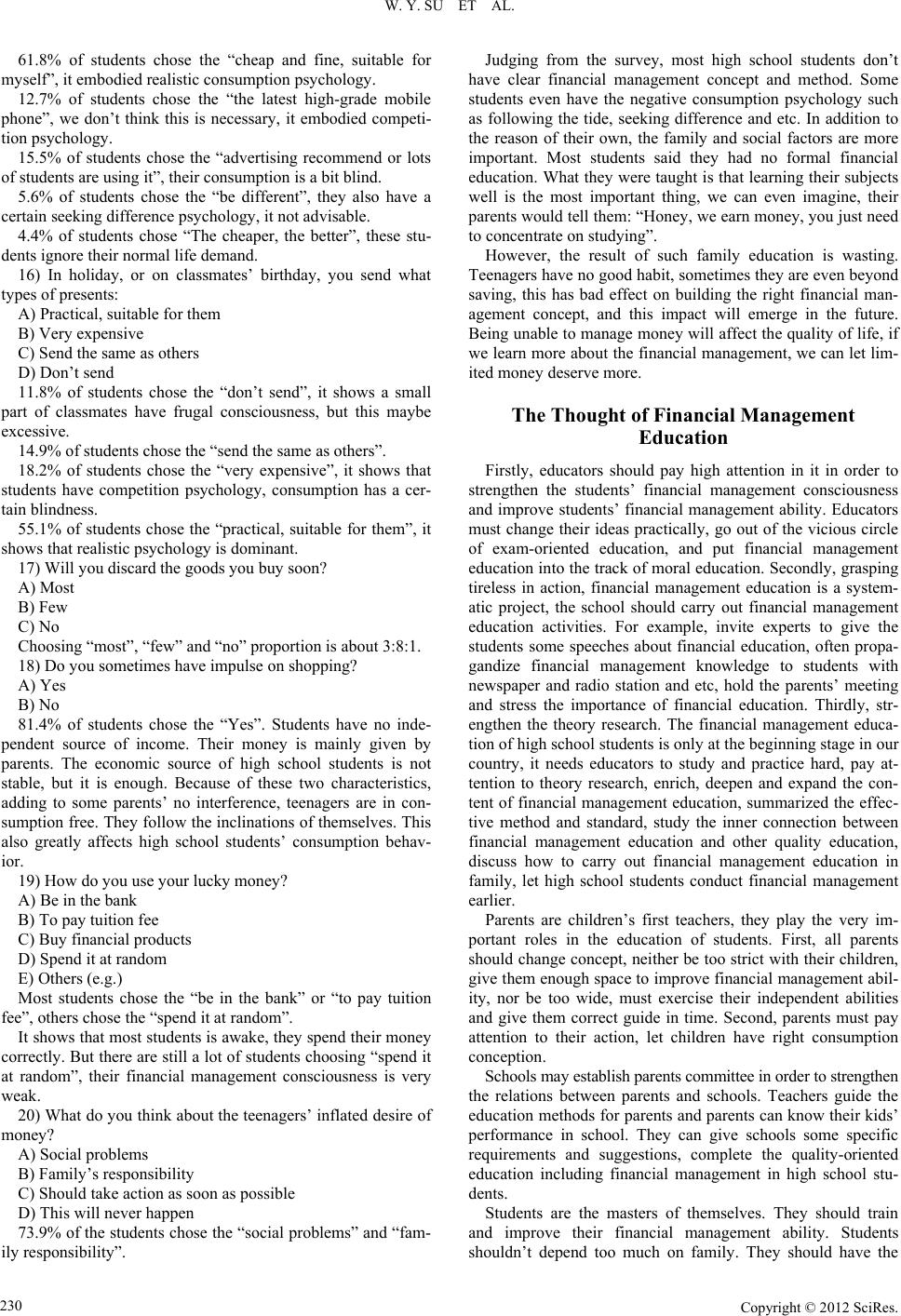
W. Y. SU ET AL.
61.8% of students chose the “cheap and fine, suitable for
myself”, it embodied realistic consumption psychology.
12.7% of students chose the “the latest high-grade mobile
phone”, we don’t think this is necessary, it embodied competi-
tion psychology.
15.5% of students chose the “advertising recommend or lots
of students are using it”, their consumption is a bit blind.
5.6% of students chose the “be different”, they also have a
certain seeking difference psychology, it not advisable.
4.4% of students chose “The cheaper, the better”, these stu-
dents ignore their normal life demand.
16) In holiday, or on classmates’ birthday, you send what
types of presents:
A) Practical, suitable for them
B) Very expensive
C) Send the same as others
D) Don’t send
11.8% of students chose the “don’t send”, it shows a small
part of classmates have frugal consciousness, but this maybe
excessive.
14.9% of students chose the “send the same as others”.
18.2% of students chose the “very expensive”, it shows that
students have competition psychology, consumption has a cer-
tain blindness.
55.1% of students chose the “practical, suitable for them”, it
shows that realistic psychology is dominant.
17) Will you discard the goods you buy soon?
A) Most
B) Few
C) No
Choosing “most”, “few” and “no” proportion is about 3:8:1.
18) Do you sometimes have impulse on shopping?
A) Yes
B) No
81.4% of students chose the “Yes”. Students have no inde-
pendent source of income. Their money is mainly given by
parents. The economic source of high school students is not
stable, but it is enough. Because of these two characteristics,
adding to some parents’ no interference, teenagers are in con-
sumption free. They follow the inclinations of themselves. This
also greatly affects high school students’ consumption behav-
ior.
19) How do you use your lucky money?
A) Be in the bank
B) To pay tuition fee
C) Buy financial products
D) Spend it at random
E) Others (e.g.)
Most students chose the “be in the bank” or “to pay tuition
fee”, others chose the “spend it at random”.
It shows that most students is awake, they spend their money
correctly. But there are still a lot of students choosing “spend it
at random”, their financial management consciousness is very
weak.
20) What do you think about the teenagers’ inflated desire of
money?
A) Social problems
B) Family’s responsibility
C) Should take action as soon as possible
D) This will never happen
73.9% of the students chose the “social problems” and “fam-
ily responsibility”.
Judging from the survey, most high school students don’t
have clear financial management concept and method. Some
students even have the negative consumption psychology such
as following the tide, seeking difference and etc. In addition to
the reason of their own, the family and social factors are more
important. Most students said they had no formal financial
education. What they were taught is that learning their subjects
well is the most important thing, we can even imagine, their
parents would tell them: “Honey, we earn money, you just need
to concentrate on studying”.
However, the result of such family education is wasting.
Teenagers have no good habit, sometimes they are even beyond
saving, this has bad effect on building the right financial man-
agement concept, and this impact will emerge in the future.
Being unable to manage money will affect the quality of life, if
we learn more about the financial management, we can let lim-
ited money deserve more.
The Thought of Financial Management
Education
Firstly, educators should pay high attention in it in order to
strengthen the students’ financial management consciousness
and improve students’ financial management ability. Educators
must change their ideas practically, go out of the vicious circle
of exam-oriented education, and put financial management
education into the track of moral education. Secondly, grasping
tireless in action, financial management education is a system-
atic project, the school should carry out financial management
education activities. For example, invite experts to give the
students some speeches about financial education, often propa-
gandize financial management knowledge to students with
newspaper and radio station and etc, hold the parents’ meeting
and stress the importance of financial education. Thirdly, str-
engthen the theory research. The financial management educa-
tion of high school students is only at the beginning stage in our
country, it needs educators to study and practice hard, pay at-
tention to theory research, enrich, deepen and expand the con-
tent of financial management education, summarized the effec-
tive method and standard, study the inner connection between
financial management education and other quality education,
discuss how to carry out financial management education in
family, let high school students conduct financial management
earlier.
Parents are children’s first teachers, they play the very im-
portant roles in the education of students. First, all parents
should change concept, neither be too strict with their children,
give them enough space to improve financial management abil-
ity, nor be too wide, must exercise their independent abilities
and give them correct guide in time. Second, parents must pay
attention to their action, let children have right consumption
conception.
Schools may establish parents committee in order to strengthen
the relations between parents and schools. Teachers guide the
education methods for parents and parents can know their kids’
performance in school. They can give schools some specific
requirements and suggestions, complete the quality-oriented
education including financial management in high school stu-
dents.
Students are the masters of themselves. They should train
and improve their financial management ability. Students
shouldn’t depend too much on family. They should have the
Copyright © 2012 SciRe s .
230